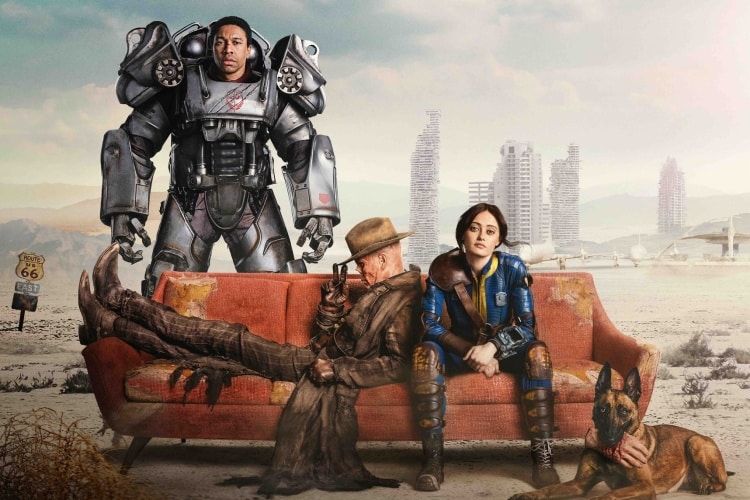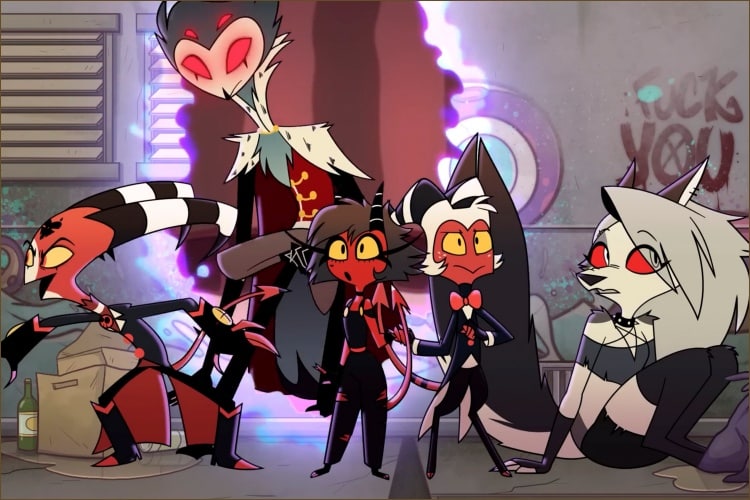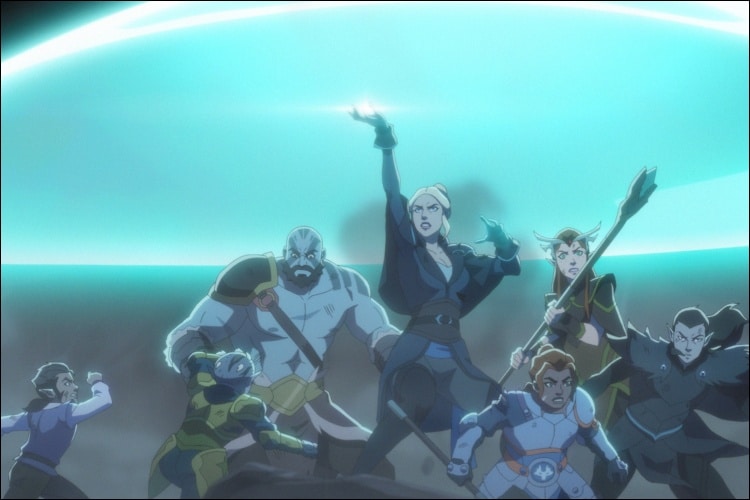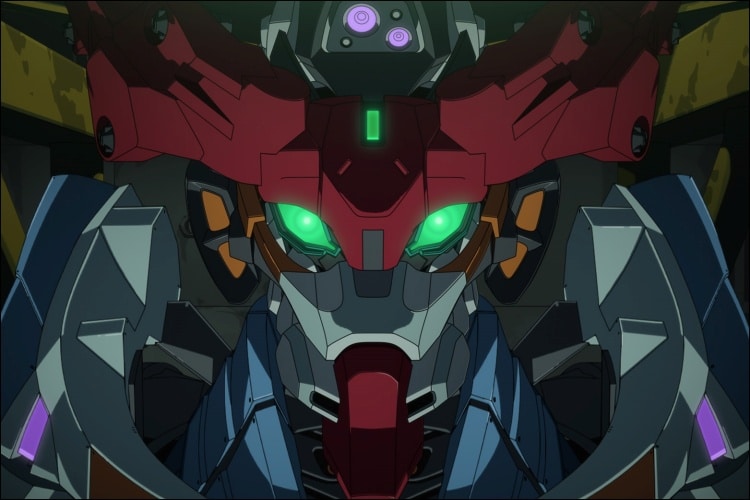Fallout Says Hooray For Hollywood
Starring: Ella Purnell, Aaron Moten, Moises Arias, and Walton Goggins
Created By: Graham Wagner, Geneva Robertson-Dworet
Lucy: “I’m not going back without my dad.”
Fallout “The Target” (Season 1, Episode 2)
Dr. Wilzig: “If you insist on staying, then you will have to adapt. Question is will you still want the same things… when you have become a different animal altogether.”
Amazon is throwing its hat into the video game adaptation ring. Fallout features a world two hundred years after a global thermonuclear war. People have changed to survive, monstrosities have mutated, but war… war never changes.
So is Fallout rad or Red? Let’s find out.
Scene Select
The Good
Crawl Out Through the Fallout
[an armored figure flies down into a shootout]
“The Target” (Season 1, Episode 2)
Maximus: “Knight Titus of the Brotherhood of Steel. Stand down or be cut down.”
The Ghoul: “…You gotta be fuckin’ kidding me.”
Fallout’s games never have a main character. You design your own and decide how they act. While difficult to adapt for television, that also gives writers more freedom. The three stars of Fallout run the gamut of alignments, factions, and playstyles.
Lucy MacLean is a folksy teacher descended from people who survived the apocalypse in massive Vaults. She leaves her Vault to rescue her kidnapped father from a gang of raiders.
Lucy is friendly and optimistic, but naive. She often flounders when speaking to surface dwellers and struggles to balance her sheltered views against reality. Lucy wields a tranquilizer gun and a pistol, and uses improvised weapons when those aren’t enough.
Maximus is a squire of The Brotherhood of Steel, an authoritarian order dedicated to destroying mutants and confiscating Pre-War tech. His assigned Knight is killed during a mission, leading Maximus to impersonate him and act as an impulsive, self-serving knight errant.
Maximus wants to be a hero like the Knight who recruited him as a child, but is murderous when people get in his way. He wears a suit of Power Armor, granting superhuman strength, durability, and flight despite being as slow as a dumpster without wheels.
Cooper Howard was a Will Rogers-style actor who lived before the bombs dropped. He struggled with an increasingly jingoistic public that wanted more violent movies than he was comfortable making. Cooper feared a potential nuclear war and viewers see America’s last days through his eyes.
200 years later, Cooper has become a mutated bounty hunter called The Ghoul. The now-cruel actor more resembles Lee Van Cleef playing Simon Legree. He specializes in pistols, rifles, lassos, and other cowpoke essentials. The Ghoul’s mutation lets him regenerate, but will make him feral unless he periodically takes medicine.
Atom Bomb Baby
Maximus: “Fiends. Should’ve known.”
“The Past” (Season 1, Episode 5)
Lucy: “What’s a Fiend?”
Maximus: “It’s people who… eat people.”
Lucy: “…I hate it up here.”
Radiation has permeated Fallout’s Wasteland. It makes California resemble a desert with precious little greenery or non-contaminated supplies. Wildlife has changed the most, and not just animals.
Surface dwellers have adapted to minimal supplies and constant paranoia. Most keep to themselves, but Raiders steal, kill, or rape whatever they can find. You never know if someone is a good-natured wanderer or a cannibalistic Fiend.
Radiation has made animals bigger, stronger, and meaner. Cat-sized Radroaches are a recurring threat. Ghouls appear somewhat frequently. They are semi-immortal people exposed to massive amounts of radiation, who will turn into zombified Feral Ghouls without a rare drug..
A few boss monsters also appear, including a Ghoulified bear and a sea monster called The Gulper. There is also a cheery, butler-esque robot who has been programmed to harvest people’s organs, as one does.
Dear Hearts and Gentle People
Lucy: “Well, I know that it can’t have been easy up here with all the dirt and-and murders, but the mission of the Vaults should be important to everyone.”
“The Target” (Season 1, Episode 2)
Ma June: “And why is that?”
Lucy: “Well, ah… well, you see, the idea is… um… that we’re going to… save America…”
Life is what happens when you aren’t running from radioactive bears. Fallout has several factions dealing with their own issues while the stars go on adventures
Vault 33 is Lucy’s seemingly idyllic home. Everyone is as affable as you can get without becoming a crossover between The Andy Griffith Show and The Stepford Wives. The Vault dwellers plan to emerge in a few years and restore America by educating the surface dwellers. Their comfortable lifestyle is torn asunder after fighting off invading Raiders.
Vault 33 struggles to move on from the attack. They plan to rehabilitate the surviving Raiders and elect a replacement Overseer in place of Lucy’s kidnapped father. Meanwhile, her brother Norman investigates how the Raiders got into the Vault and discovers a conspiracy involving neighboring Vault 31.
The Raiders are led by Lee Moldaver, an enigmatic woman somehow connected to Lucy’s parents. Every surface dweller fears Lee, not least because of her well-armed enforcers. Lucy’s hunt for her father and The Ghoul’s memories slowly reveal Moldaver’s ultimate goal.
Dr. Wilzig is a scientist with a massive target on his back. He worked for The Enclave, fascist remnants of the U.S. Government, and stole something that Moldaver desperately wants. He stores it in his head, which is quickly chopped off. Dr. Wilzig’s head becomes a Macguffin that everyone will go head-to-head for.
Fallout’s Golden Oldies
DJ Carl: “Like most weeks here at KPSS, this week is Fiddle Week, when all of my airtime will be spent luxuriating in my small but mighty collection of fiddle tunes.”
“The Radio” (Season 1, Episode 4)
Fallout’s style has always been a futuristic version of the early Fifties, and that extends to its soundtrack that features styles prior to the birth of Rock and Roll.
Classic pop stars fill the soundtrack, including The Ink Spots, The Andrew Sisters, and Perry Como. Simple farmers may be introduced with June Christy’s “Give Me The Simple Life” while Maximus tries out his power armor accompanied by Betty Hutton’s “It’s A Man.”
Several songs reflect the characters, such as The Ghoul reminiscing about his life to Buck Owens’ “Act Naturally” or Lucy and Maximus relaxing in a Vault while “Let’s Go Sunning” by Jack Shaindlin blares. Episodes often end with more ominous and mournful tunes, such as “It’s All Over But The Crying”, “The End of the World”, and Fallout’s unofficial theme “I Don’t Want To Set The World on Fire.”
Fallout isn’t entirely dependent on licensed music. There are many quiet themes playing between the bombastic oldies, such as “Brotherhood of Steel”, “The Ghoul”, and “War Never Changes”. The showrunners also sneak in the Fallout 4 videogame theme when Lucy finds a flag belonging to a long-gone faction.
The Bad
We’ll Meet Again
The Ghoul: “War never changes. You look at this Wasteland, looks like chaos. But there’s always somebody behind the wheel and that’s who I want to talk to.”
“The Beginning” (Season 1, Episode 8)
Coincidences are common television tropes that require viewers accept some unrealistic events. Unfortunately, Fallout quickly uses up its supply of suspended disbelief on a silly cause.
The main characters are from different walks of life and have different motivations. Somehow, they keep stumbling onto each other without good reason. Dr. Wilzig spotting Lucy’s campfire in a dark desert? That’s acceptable. He and the three main characters showing up in the same town at the same time and getting into a brawl? A little more questionable.
There is a brief explanation that everyone has their own trackers for Wilzig’s stolen tech, but it gets silly when they split off for sidequests and keep unintentionally finding each other. The head isn’t staying in one place, so the characters would likely take different routes in between plot relevant detours. You can almost see the writers moving Heaven and Earth to get everyone where they need to be.
The Verdict
Despites such machinations, Fallout hits the bullseye. 1950s culture and ideals balance out a brutal post-apocalyptic wasteland. The stars reflect different factions and values while tangling with mutants and malcontents. The writers are heavy handed when ensuring everyone ran into each other, but that’s a quibble. Fallout is worth your time.

Jared Bounacos has written for Movie Rewind since 2016.





Comments
Secret Level Season 1 Review - Movie Rewind
[…] Fallout: Season 1 ReviewArcane: League of Legends Season 1 ReviewCastlevania Nocturne: Season 1 Review […]